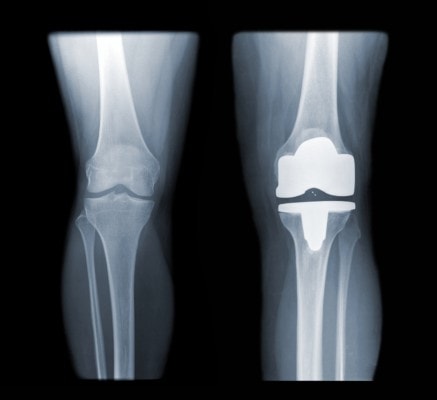Do Knee Replacement Patients have a Dramatically Increased Risk for Certain Cancers?

The knee on the right has been replaced. Skyhawk X/Shutterstock
A real shocker research study out this month. This one shows that a 30 year follow-up of patients with knee replacements showed a dramatically increased rate of multiple cancer types. The most concerning part of this large and long-term study on knee replacement surgery risks was that the risk for leukemia type cancers was increased approximately 300-700%! While this is only one study, the magnitude of some of these increased cancer risks is very troubling. If these increased risks were a mere 10% or so, than the effect may be due to other things and not the knee replacement. However, relative risk increases of this magnitude likely mean that where there’s smoke, there’s probably fire. For example, other types of cancers were elevated in the knee replacement group, but these elevations were small, so these may or may not be caused by knee replacement surgery. The investigators concluded that the blood cancers may be caused by metals leaching from the knee prosthesis over long periods of time. This isn’t too surprising, as it was recently reported that scoliosis patients with surgical fusions had high levels of chromium in their blood which leached from the fusion prosthesis. One the other hand, one of my research colleagues brought up that the effect could have been caused by the arthritis (or maybe some property of the arthritis like long-term medication use) and that another group should have been included in the study. While this could be, I think if different types of arthritis lead to certain cancers, we would know by now. Medications are a possible, but unlikely cause. It should be noted that this the the only study we’re aware of that makes this association, so realize this finding has yet to be confirmed by other research.
In summary, while I’ve had many patients through the years who didn’t want a knee replacement due to the significant surgical risks associated with this operation, this is one risk that comes a bit out of left field, but that could make sense. Patients have said to me for years, “I don’t want that metal knee in my body”, little did I know that they maybe guessed something I didn’t think of, that the metal knee may cause problems!

NOTE: This blog post provides general information to help the reader better understand regenerative medicine, musculoskeletal health, and related subjects. All content provided in this blog, website, or any linked materials, including text, graphics, images, patient profiles, outcomes, and information, are not intended and should not be considered or used as a substitute for medical advice, diagnosis, or treatment. Please always consult with a professional and certified healthcare provider to discuss if a treatment is right for you.
